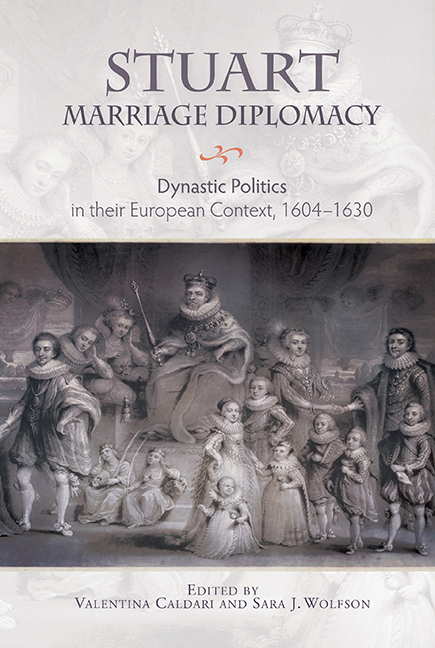Book contents
- Frontmatter
- Contents
- List of Illustrations
- List of Contributors
- Acknowledgements
- List of Abbreviations
- Introduction
- Part One Marriage and the Court
- Part Two Marriage and Politics
- 4 ‘The onely soveraigne medecine’: Religious Politics and Political Culture in the British–Spanish Match, 1596–1625
- 5 James I and the Dissolution of the 1621 Parliament through Spanish Eyes
- 6 War, Diplomacy and Stability in the North of Europe in the Early Seventeenth Century
- 7 The Atlantic Politics of Early Stuart Diplomacy
- 8 Mercantile Diplomacy: Corporations, States and International Negotiation
- Part Three Marriage and War
- Part Four Marriage and News
- Part Five Marriage and Continental Europe
- Part Six Marriage and Ceremony
- Bibliography
- Index
- Studies in Early Modern Cultural, Political and Social History
5 - James I and the Dissolution of the 1621 Parliament through Spanish Eyes
from Part Two - Marriage and Politics
Published online by Cambridge University Press: 24 October 2019
- Frontmatter
- Contents
- List of Illustrations
- List of Contributors
- Acknowledgements
- List of Abbreviations
- Introduction
- Part One Marriage and the Court
- Part Two Marriage and Politics
- 4 ‘The onely soveraigne medecine’: Religious Politics and Political Culture in the British–Spanish Match, 1596–1625
- 5 James I and the Dissolution of the 1621 Parliament through Spanish Eyes
- 6 War, Diplomacy and Stability in the North of Europe in the Early Seventeenth Century
- 7 The Atlantic Politics of Early Stuart Diplomacy
- 8 Mercantile Diplomacy: Corporations, States and International Negotiation
- Part Three Marriage and War
- Part Four Marriage and News
- Part Five Marriage and Continental Europe
- Part Six Marriage and Ceremony
- Bibliography
- Index
- Studies in Early Modern Cultural, Political and Social History
Summary
In the well-known satirical pamphlet Vox Populi, set in Spain and written by the puritan Thomas Scott in 1620, the author depicts a fictitious session of the council of state in Madrid. Scott makes the Spanish ambassador Gondomar say that the greatest achievement in his role as envoy at the court of King James I had been to worsen relations between the ruler and his House of Commons, to the point that the Stuart sovereign would not want to ever convene a parliament again, even if he were to be in need. According to Scott's Gondomar, because it was very unlikely that another parliamentary assembly would be summoned, the only possible way for the king of England to pay off his debts was through a Spanish marriage for his son, Prince Charles. Instances of discussions within the political nation involving the role of parliament combined with notions of foreign policy and royal marriage were by no means isolated cases in England. Indeed, they intensified strongly between 1620 and 1621, when the convening of parliament was imminent, and despite James's proclamations in December 1620 and again in July 1621 against ‘excesse of Lavish and Licentious speech of matters of State’. In Spain too, the parliament of 1621, and its subsequent dissolution, became a topic of much discussion. Much like Scott's caricature, when writing to the council of state in March 1621, Ambassador Gondomar seemed indeed certain that King James would have soon dissolved parliament ‘as he had done in the past’, and would not convene another assembly in his life. Moreover, copies of the Commons’ declaration, of the king's reply, and of the proclamation to dissolve parliament in 1622 were translated into Spanish and sent, by Gondomar, from London to Madrid.
Anyone who approaches early Stuart parliaments is particularly indebted to Conrad Russell, who identified the two crucial issues of the 1620s as foreign affairs and marriage. In his seminal work on Parliaments and English Politics, 1621–1629, he stated that parliament in the early seventeenth century was still ‘an event and not an institution’. The fact that parliament was not an institution meeting on a regular basis has broader implications. Not only did many events occur in the periods in which the assembly was not meeting, but also many issues were discussed outside parliament.
- Type
- Chapter
- Information
- Stuart Marriage DiplomacyDynastic Politics in their European Context, 1604–1630, pp. 79 - 94Publisher: Boydell & BrewerPrint publication year: 2018

